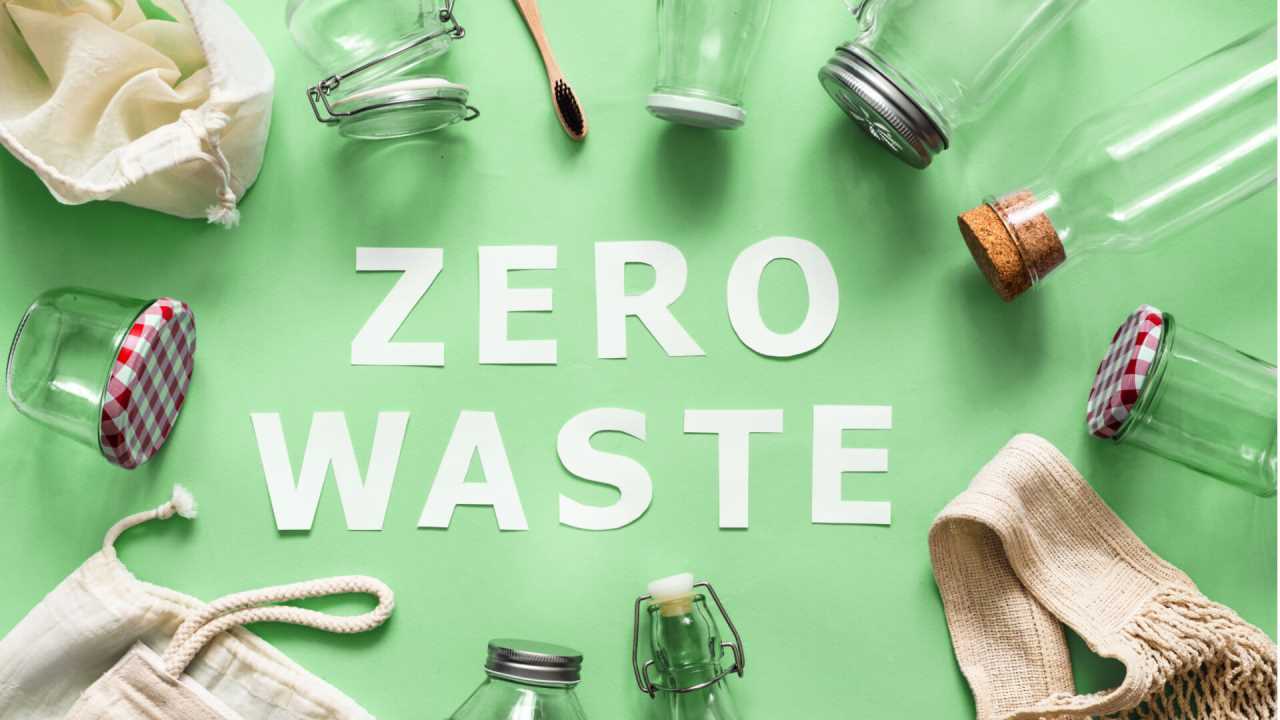Zero waste lifestyle is a deliberate choice to lessen one’s environmental impact by generating as little waste as possible; it’s not just a fad. Our daily decisions, both large and small, have an effect on the environment. Every action we take, from the things we purchase to how we discard them, adds up. At first, adopting a zero-waste lifestyle may seem daunting, but with a few deliberate habits, it turns into a fulfilling and sustainable way of living.
Understanding the Zero Waste Concept
Sending nothing to landfills or incinerators is the fundamental tenet of the zero waste philosophy. In order to reuse all products, it promotes redesigning our resource life cycles. It is basically about switching from a linear economy (take, make, dispose) to a circular economy (reuse, recycle, regenerate). This change lowers pollution and greenhouse gas emissions while also conserving resources.
Here is a useful comparison to help you better understand the main distinctions between traditional living and a zero-waste approach:
| Conventional Living | Zero Waste Living |
| Single-use plastic items | Reusable alternatives (metal, glass, cloth) |
| Fast fashion purchases | Minimalist, sustainable wardrobe choices |
| Buying packaged groceries | Shopping in bulk with own containers |
| Disposing food scraps in trash | Composting at home or via community services |
| Frequent household trash | Almost no landfill-bound waste |
This table serves as a reminder that little adjustments add up, not to place blame on anyone. Being a zero-waste expert doesn’t have to happen overnight. Begin modestly. Begin where you are.
Practical Tips to Begin Your Zero waste lifestyle
Start with the 5 R’s: Refuse, Reduce, Reuse, Recycle, Rot
The zero waste lifestyle is based on these five tenets. Let’s dissect them:
- Say no to plastic straws, junk mail, and freebies.
- Buy only what you need and cut back on consumption.
- Instead of throwing and replacing, reuse and repair.
- Recycle only what you are unable to reuse, reduce, or refuse.
- All organic waste, including food scraps and yard waste, can be composted or allowed to rot.
Switch to Reusable Everyday Items
Replacing single-use items with long-lasting alternatives is one of the simplest ways to reduce waste. For instance, using reusable water bottles rather than single-use ones.
- Use beeswax wraps rather than cling film.
- Use cloth towels and napkins rather than paper ones.
- Use bamboo or stainless steel straws rather than plastic ones.
You don’t have to purchase everything at once. As you use up the disposable versions, gradually replace the items. It’s not a race, but a journey.
Bulk Shopping and DIY Products
Packaging waste is greatly reduced when purchasing in bulk. When purchasing grains, nuts, spices, and even household detergents, if your local store permits it, bring your own jars, cloth bags, or containers.
DIY recipes are revolutionary for items like cleaning supplies and personal care items. Not only is it more cost-effective, but making your own all-purpose cleaner with vinegar, lemon peels, and baking soda is also environmentally friendly.
Composting: Turning Scraps into Soil
Although it may seem like a hobby for those with large backyards, zero waste lifestyle urban composting options are becoming more widely available. You can use a bokashi system, which ferments food scraps, or compost indoors with a small bin. Even curbside compost pickup is available in some cities.
The outcome? Instead of becoming landfill methane, your food waste turns into nutrient-rich soil.
Zero Waste in Different Areas of Your Life
In the Kitchen
- Buy fresh, local produce with minimal packaging.
- Use glass jars for storing grains, legumes, and spices.
- Cook more at home to avoid takeout packaging.
- Save vegetable scraps to make broth before composting them.
In the Bathroom
- Switch to shampoo bars and solid soap instead of bottled products.
- Use a safety razor instead of disposable razors.
- Opt for bamboo toothbrushes and natural floss.
- Make your own toothpaste or buy it in refillable containers.
In the Closet
Fast fashion is one of the biggest environmental offenders. Instead of buying cheap clothes that fall apart in months, invest in quality items that last.
- Shop secondhand or vintage.
- Choose natural fibers like cotton, hemp, or linen.
- Learn to mend small holes or sew on missing buttons.
On the Go
- Always carry a reusable bag.
- Bring your own cup for coffee or smoothies.
- Refuse plastic cutlery—carry a bamboo set in your bag.
- Keep a cloth handkerchief instead of using paper tissues.
These small habits help reduce your personal waste significantly over time.
Mindset Shifts That Make a Difference
Living zero waste involves more than just the things you use; it also involves the attitude you take on.
It’s about taking your time, making thoughtful purchases, and realizing that everything you “throw away” ends up somewhere. It frequently ends up in an incinerator, landfill, or the ocean.
Recall that perfection is not the goal. One day at a time, it’s about making better decisions.
Challenges You Might Face (And How to Overcome Them)
Social Pressure or Lack of Support
Your family and friends may not comprehend your decisions. It’s alright. Instead of attempting to convert everyone at once, set an example. Lectures are not as powerful as actions.
Limited Access to Bulk or Refill Stores
Try your best if you live in a place where shopping with zero waste lifestyle is uncommon. Make reducing and reusing a priority. You can still compost, avoid plastic bags, and make thoughtful purchases even if you are unable to buy in bulk.
Time and Energy
It can take a lot of time to make things yourself or look into sustainable alternatives. Begin modestly. Before proceeding, make improvements to one area (such as the restroom or grocery shopping).
Zero Waste Isn’t All or Nothing
It is important to reiterate that zero waste is not about perfection. It all comes down to consistently choosing better options. There would be a huge impact if everyone cut their waste by just 50%.
Utilize all of the resources available to you. Additionally, remember to celebrate progress rather than perfection.
Final Thoughts
Deprivation is not the goal of a zero waste lifestyle. It has to do with purpose. About prioritizing the future over fleeting ease, mindfulness over convenience, and quality over quantity. It’s a way of life that’s good for the environment, your financial stability, and your mental clarity.
Begin now. Begin modestly. Use reusable bags instead of plastic ones. Purchase a bar of your next shampoo. Refuse that pointless freebie. And be proud of the fact that, one decision at a time, you’re changing things.
Q&A: Frequently Asked Questions About Zero Waste Living
Q: In order to achieve zero waste, do I have to discard everything that is made of plastic?
A: Absolutely not. The most sustainable thing you can do is to use what you already have. Use your plastic utensils and containers until they break. Then swap them out for reusable substitutes.
Isn’t zero waste costly?
A: Although it may initially appear that way, it frequently results in long-term cost savings. Reusable products take the place of frequent purchases. DIY personal care and cleaning supplies are less expensive than store-bought ones. Items in bulk are frequently less expensive per unit.
How can I help kids go zero waste?
A: Begin modestly. Pack lunches in reusable containers, use cloth diapers if you can, and get your kids involved in do-it-yourself projects or composting. Instead of using rigid rules, teach them through enjoyment and involvement.
Is it feasible for an apartment to have zero waste?
A: Indeed! Urban zero-waste living is becoming more and more well-liked. Composting is accessible even in small spaces thanks to online bulk shopping, refill stations, and indoor composting.
What aspect of achieving zero waste is the most challenging?
A: Getting rid of old habits. The hardest part for many is being mindful and altering routines. It feels much more natural once those new habits are established.
Which is preferable, recycling or achieving zero waste?
A: Recycling should not be the first option; rather, it should be the last. A lot of things aren’t actually recyclable. By prioritizing reuse and refusal, zero waste seeks to lessen the need for recycling.
How can I maintain my motivation?
A: Challenge a friend to join you, follow bloggers who produce zero waste, or join online communities. Honor your victories, no matter how small, and never forget that even a little action is better than none at all.



